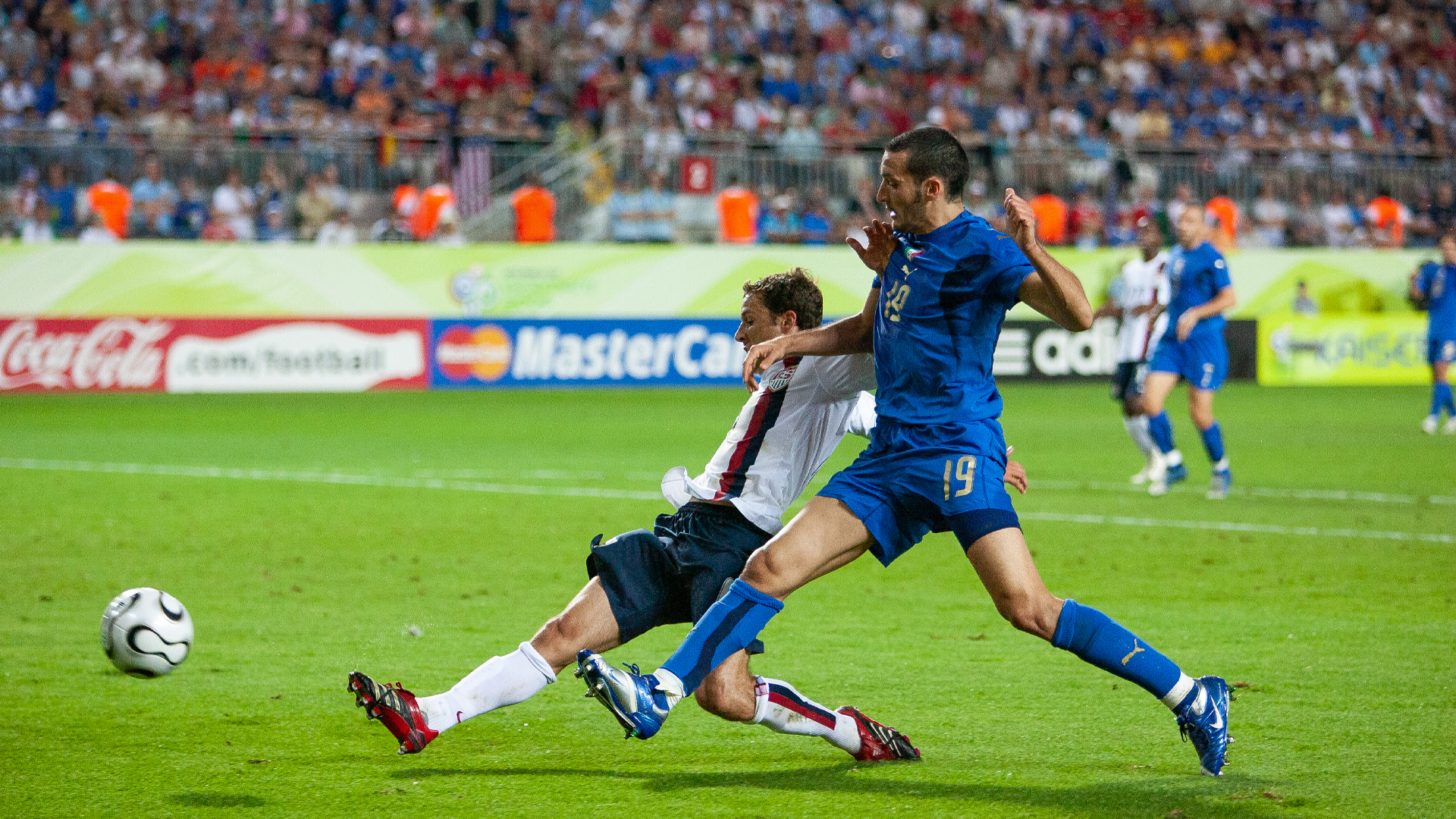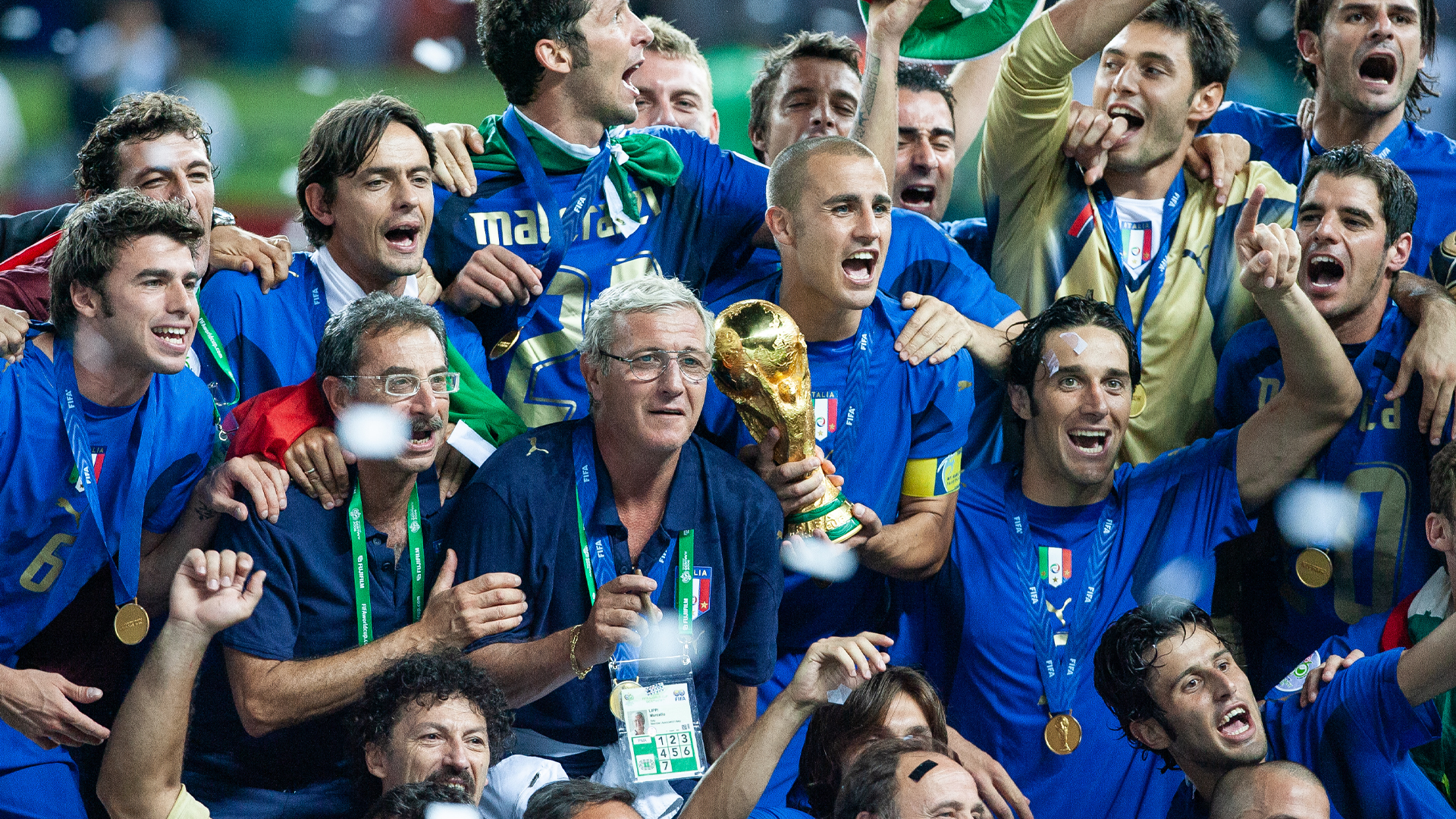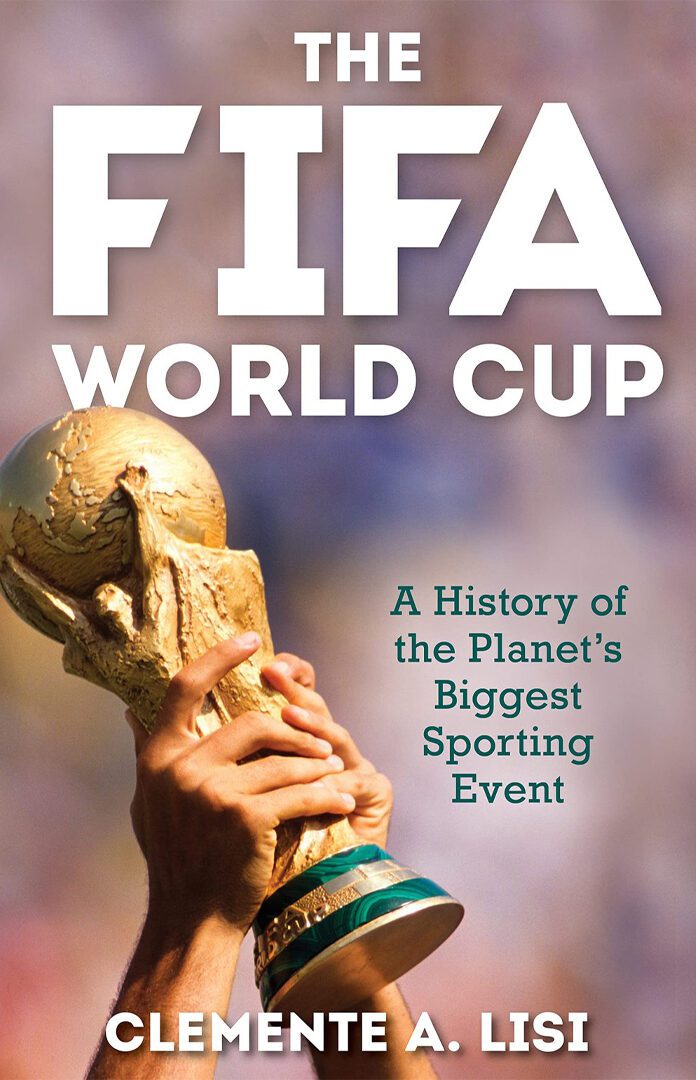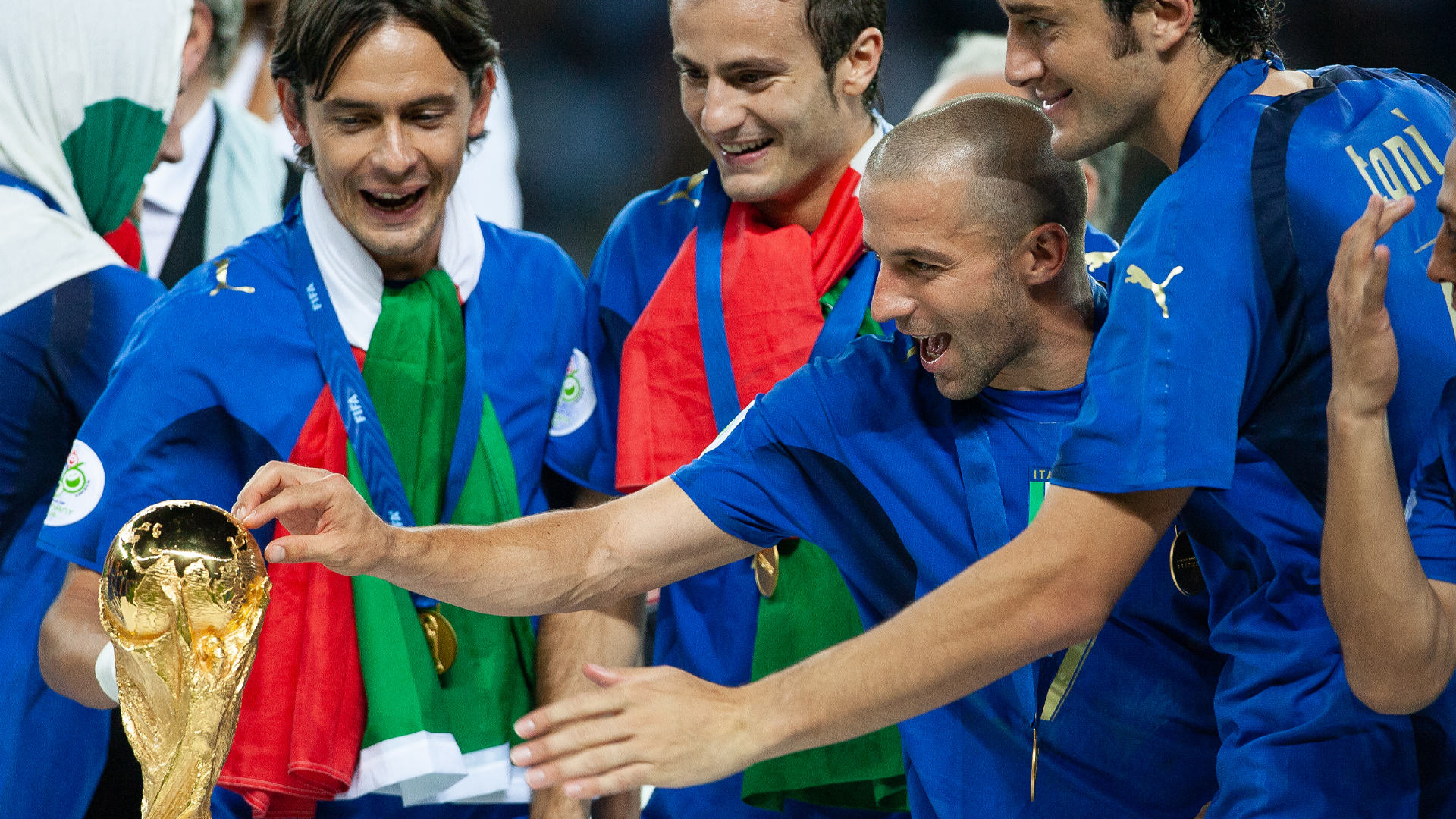The following is an excerpt from the new book, “The FIFA World Cup: A History of the Planet’s Biggest Sporting Event” published by Rowman & Littlefield.
Group E would be the tightest of them all. The meeting between the Czech Republic and the United States on June 12 in Gelsenkirchen turned into a lopsided affair. The Czechs got on the board after just five minutes when the U.S. backline was too slow to react to defender Zdeněk Grygera, who went on a furious run down the right flank. Grygera’s cross was met by the towering Jan Koller—all six foot seven of him—who headed the ball into the net past Kasey Keller. The Czechs doubled their lead with a Tomas Rosicky goal in the 36th minute. Another Rosicky goal in the 76th minute humiliated the Americans, who looked bewildered for much of the 3–0 game.
The Italians, meanwhile, broke with their tradition of being slow starters, defeating Ghana 2–0 that evening in Hanover. The Italian players, distracted by a match-fixing scandal brewing back home, started the game on the defensive but emerged as an offensive threat as the game wore on. Goals by Andrea Pirlo in the 40th minute and a second from Vincenzo Iaquinta seven minutes from time got them the win.
Five days later, Ghana stunned the Czech Republic, putting on a sparkling display for the 2–0 win. The Ghanaians, in the second match of their World Cup debut, had finally played with the flair many expected to see from them, while the Czech Republic lacked the pace and power used to defeat the Americans. Asamoah Gyan put Ghana ahead after two minutes. The Czechs failed to respond, and lone striker Vratislav Lokvenc did little to threaten Ghana’s defense. Michael Essien, one of the best playmakers to ever emerge from Africa, created chance upon chance. Gyan missed a penalty kick in the 65th minute, but Ghana got that second goal with eight minutes remaining when Sulley Muntari’s powerful shot beat goalkeeper Peter Cech.
That evening at the Fritz-Walter-Stadion in Kaiserslautern, the United States and Italy matched wits in a game the Azzurri were expected to dominate. The Italians never took charge, and the plucky Americans were able to remain competitive in a game that was rich in controversy but meager in quality. The Americans started strong, but it was Italy that took the lead after 22 minutes when Alberto Gilardino’s header off a Andrea Pirlo free kick found the back of the net. The Italians could have killed any U.S. chance of a comeback, but that second goal never came. Worse, the Azzurri complicated matters for themselves five minutes later by giving up a bizarre own goal following a Bobby Convey free kick from the right sideline. The ball hit defender Cristian Zaccardo in the leg, then took an awkward bounce and spun into the net for the own goal. The game took on an even odder twist after that. A minute after the U.S. equalizer, the Italians were down a man when midfielder Daniele De Rossi elbowed Brian McBride in the face. Uruguayan referee Jorge Larrionda pulled out a red card, and the AS Roma player was out of the game. De Rossi walked off the field as the U.S. team’s medical staff stitched up McBride’s bloody face. Seconds before the end of the first half, Larrionda pulled out his red card once again, sending off U.S. midfielder Pablo Mastroeni following a two-footed tackle on Pirlo. Both sides were even with 10 men.

KAISERSLAUTERN, GERMANY - JUNE 17: Gianluca Zambrotta of Italy and Steve Cherundolo of USA in action during the FIFA World Cup Group E match between Italy (1) and USA (1) at the Fritz-Walter Stadium on June 17th, 2006 in Kaiserslautern, Germany. (Photo by Simon Bruty/Anychance/Getty Images)
The second half featured more rough tackles and theatrics. Two minutes after the interval, the Italians gained the numerical player advantage after Eddie Pope was given a second yellow card and ejected after a tackle on Gilardino. The call seemed unjustified, particularly since Pope had won the ball on the play. Marcello Lippi’s men, unable to put the one-man advantage to good use, responded by putting in Del Piero to replace Zaccardo and Iaquinta for Luca Toni. Alessandro Del Piero had two clear scoring chances, but Keller saved them both and the game ended 1–1.
Ghana advanced as the group’s second-place team on June 22 after defeating the United States 2–1 in Nuremberg. Italy, meanwhile, won the group that same day in Hamburg, eliminating a 10-man Czech side 2–0 thanks to goals from defender Marco Materazzi and striker Filippo Inzaghi. “This team has terrific spirit, probably the most fighting spirit I have had in any team,” Lippi told reporters. “We deserve to qualify. We played two great games to beat Ghana and the Czech Republic. They are two very difficult teams.”
An hour later, a cloud fell over the win as Italian FA prosecutor Stefano Palazzi recommended that Juventus, AC Milan, Fiorentina, and Lazio be demoted to Serie B, the country’s second division, for their involvement in a match-fixing scandal, known as Calciopoli, that was starting to over- shadow much of the work the Italians had accomplished on the field at this tournament. On the eve of the World Cup, several recorded telephone calls revealed a network of cozy relationships between several team managers and referees dating back to the 2004–5 season. The transcripts from these phone taps resembled something out of a gangster movie. Juventus general manager Luciano Moggi was at the center of the scandal, though he has always maintained his innocence. Moggi was eventually banned for life from any involvement in the game. After the World Cup, Juventus was stripped of the 2004–5 title (which was left unassigned) and the 2005–6 title (subsequently awarded to Inter Milan). As punishment, the team was relegated to the second division. AC Milan, Fiorentina, Lazio, and Reggina were all given point deductions to follow the subsequent season.
***
Italy also won by a 1–0 margin against Australia on June 26 in Kaiserslautern in the round of 16. The Socceroos played the Azzurri tightly, stifling Italy’s attack the entire game. The Italians, however, spoiled any notion of another Hiddink team overachieving at a World Cup. It was a controversial Francesco Totti penalty kick in stoppage time that made the difference and saw the Azzurri though to the quarterfinals. The penalty kick came after defender Fabio Grosso fell to the ground after Lucas Neill slid into him. Grosso clumsily tried to leap over him, but instead found the turf. Referee Luis Medina Cantalejo of Spain whistled a penalty kick, and the underdogs from Down Under were out.
***
In Hamburg on June 30, Italy had little trouble eliminating Ukraine. The Azzurri took just six minutes to score when Gianluca Zambrotta picked up a cheeky backheel from Totti, blasting it into the net with a low shot from outside the box. Toni added two goals, in the 59th and 69th minutes, to give Italy a 3–0 win. The players dedicated the win to former Italy defender Gianluca Pessotto after he survived a fall from a fourth-story window at Juventus’s headquarters in Turin just three days earlier. Since he was holding a rosary, it was widely believed to be a suicide attempt. The plunge coincided with widening investigations regarding match-fixing allegations. Though not implicated in the scandal, Pessotto was said to be depressed with his role as the club’s team manager. He suffered multiple fractures and internal bleeding as a result of the fall. He was released from the hospital a month later. At the end of the game, Italian players posed behind a banner expressing support for their friend with the message: “We are with you, Pessotto.”
***
With Brazil eliminated, the four semifinals saw Germany among the favorites to win it all. Host nations had traditionally done well, and Klinsmann’s team had looked stronger with each passing round.
Standing in Germany’s way was rival Italy. The Azzurri did what they often did best at the World Cup by combining strong defense and counterattacks. The July 4 game in Dortmund was a stalemate for much of the contest, both teams evenly matched and somewhat afraid of exposing themselves too much in order to avoid conceding a goal.
The game ended scoreless, but the Italians appeared rejuvenated in extra time. With a minute left to play in extra time, Pirlo played the ball to Grosso. The defender one-timed the ball with his left foot as the ball curled past the left post. The goal sent Grosso, his teammates, and Italian fans everywhere into ecstasy. Not to be outdone, Italy added a second two minutes later in stoppage time. Fabio Cannavaro broke up the German attack, then powered the ball forward. Gilardino then fed a pass to Del Piero, who chipped the ball into the goal for the 2–0 win. Germany, meanwhile, would take third place. Klinsmann stepped down as manager to spend more time with his family.
In the second semifinal the following day, France edged Portugal 1–0 in Munich. Once again, Zidane made the difference for Les Bleus, converting a penalty kick after 33 minutes to put his nation back into a World Cup final for the second time in eight years. “Now that we are here, after all the effort we have made, we will try and bring it home,” Zidane told reporters after the game. “It won’t be easy. It will be difficult, but we have the weapons to do it. We have the will to do it.”
Italy and France did battle in the final just six years after the sides met at the 2000 European Championship. On that occasion in Rotterdam, Italy, 30 seconds away from pulling off a 1–0 win, conceded the equalizer in stoppage time. A golden goal by David Trezeguet won France the trophy. The World Cup rematch was played on July 9 in Berlin’s Olympiastadion before 69,000. The Italians were favored, but Zidane’s performances against Spain and Brazil made France a legitimate contender for the final prize. Many had predicted a scoreless tie—given the strong defenses—but they would be mistaken.
Zidane put France ahead after seven minutes after Florent Malouda was brought down by Materazzi. Referee Elizondo pointed to the spot, apparently fooled by Malouda’s dramatic fall. Zidane stepped up to take the shot, cheekily chipping the ball to Buffon’s left, which hit the underside of the crossbar and bounced to the ground just inches past the line for the goal. A seemingly relieved Zidane raised his arms in relief, jogging away as his teammates hugged him. The old magician had conjured up one more trick. In the process, Zidane, who was playing in his last game, had made history, joining Brazilians Pelé and Vavá and Germany’s Paul Breitner as the only players to ever score in two World Cup final games.
The Italians, down for the first time at the tournament, quickly reacted. Materazzi made amends for conceding the penalty when he headed the ball off Pirlo’s out-swinging corner kick, towering over the French defense to tie the score in the 19th minute. The Italians nearly took the lead in the 36th minute when Toni’s header, off another Pirlo corner kick, hit the crossbar.
The game went to extra time. Trezeguet, the hero six years earlier, was subbed in for Franck Ribéry in the 100th minute, but he was to become the villain here. Zidane came back to life again in extra time, bursting into the box with a powerful header that was tipped over the bar by Buffon. The play, the stuff of highlight reels, would be overshadowed by another Zidane header of a different sort.
Zidane, in a moment that can only be described as insanity, charged toward Materazzi, head-butting the Italian defender in the chest. Marco Materazzi fell to the ground the moment Zidane thrust his head into him. Elizondo did not see the infraction, but Buffon ran toward him to point out the offense. Elizondo consulted his assistant, but it was the fourth official, Luis Medina Cantalejo of Spain, stationed in between the Italian and French benches, who saw the head butt.
Questions arose immediately afterward as to whether Cantalejo had seen TV replays on a small monitor placed along the sidelines. If he had, Cantalejo would be the first referee ever to use instant replay. FIFA said afterward that TV technology was never used as part of the decision that led to Zidane’s red card. In fact, the majority of those in the stands had not seen the incident. How else could it be explained that the decision to eject Zidane was greeted by a chorus of jeers?

BERLIN, GERMANY - JULY 09: Fabio Cannavaro and Marcello Lippi coach of the Italian team with the World Cup Trophy. World Cup Final match between France (1) and Italy (1). Italy would win on penalties (5) to (3) at the Olympiastadion on July 09, 2006 in Berlin, Germany. (Photo by Simon Bruty/Anychance/Getty Images)
Zidane did not argue the decision and slowly made his way into the tunnel to the dressing rooms, his head slumped down as he walked past the podium where the World Cup trophy was sitting. The image of Zidane walking past the trophy, so close and yet so far away from his grasp, a defeated man in his last game, was surreal. Speaking for the first time since the incident three days after the game, Zidane said in an interview on Canal Plus, a French television network, that Materazzi cursed at him and mentioned his sister. “I tried not to listen to him, but he repeated them several times,” Zidane said about Materazzi’s taunts. “Sometimes words are harder than blows. When he said it for the third time, I reacted.” For months, Materazzi vehemently denied Zidane’s account, but he eventually admitted to making an inappropriate comment about the Frenchman’s sister. The incident was a sad ending to another emotion-filled World Cup.
The game would need a shootout to determine a winner. Pirlo, Materazzi, De Rossi, Del Piero, and Grosso all scored for Italy in the shootout. The winning kick—off of a ferocious left-footed shot by Grosso that flew into the upper right corner of the goal past Fabian Barthez— sent the Italian players into hysterics. The Italians won a fourth World Cup, and Cannavaro celebrated by planting a kiss on the trophy before proudly lifting it toward the sky in a sea of white confetti. For Italy, beset by a scandal back home, the victory was further evidence that the country remained a perennial soccer power.
“The FIFA World Cup: A History of the Planet’s Biggest Sporting Event” is available for sale at Amazon.

Clemente Lisi
Clemente Lisi teaches journalism at The King’s College in New York City. He has worked as a journalist and editor for over two decades. In that time, he has been an editor at the New York Post and the New York Daily News. He also has experience in the digital space, serving as a senior editor at ABC News. He grew up in New York and is the son of Italian immigrants from Naples.


